French President Emmanuel Macron has been re-elected, defeating far-right candidate Marine Le Pen.
French President Emmanuel Macron was re-elected on Sunday with 58.6% of the vote share compared to 41.4% for far-right candidate Marine Le Pen.
 ADVERTISEMENT
ADVERTISEMENT
 ADVERTISEMENT
ADVERTISEMENT
The two candidates had presented fundamentally different visions of France and Macron acknowledged in a victory speech that many voters supported him only to counter the far-right. He called on the divided population to be "benevolent and respectful" and promised a "new era".
Abstention was estimated by pollster Ipsos to be at around 28% nationally, which would be the highest since 1969, with many voters rejecting a repeat of the 2017 election.
Here's a look at how election night unfolded.

 ${title}
${title}
Live ended
Key updates:
- French President Emmanuel Macron is re-elected with 58.55% of the votes, defeating far-right challenger Marine Le Pen, with 41.45%.
- Le Pen called her vote share -- an increase from 2017 -- a "resounding victory" and vowed to fight during the legislative elections in June.
Macron acknowledged that many people voted for him to counter Le Pen, commending their "sense of duty" and "attachment to the Republic."
- "We can count on France for five more years," said EU Council President Charles Michel in a tweet, as other European politicians said Macron's victory was a "relief".
- Macron will face several challenges ahead despite his victory on Sunday as he inherits a deeply divided country.
- Here are five main takeaways from France's election night.
Official results in French election
Emmanuel Macron received 58.55% of the vote share with 18,779,812 votes.
Marine Le Pen received 41.45% of the vote share with 13 297 729 votes.
Here are the latest results based on 99% of votes counted
- Emmanuel Macron -- 58.3%
- Marine Le Pen -- 41.66%
Here are the latest results based on 95% of votes counted
- Emmanuel Macron -- 57.13%
- Marine Le Pen -- 42.87%
'Macron will have to take the mantle of European diplomatic leadership again,' says analyst
Emmanuel Macron "will have to take the mantle of European diplomatic leadership again," said Tara Varma, head of the European Council on Foreign Relations' Paris office.
"Macron’s victory means the pursuit of an ambitious project for Europe. He will be advocating to double down on the European sovereignty agenda: on tech, on defence, on fighting economic coercion," she said.
"He also needs to ensure the ongoing French EU presidency is a success."
Macron says he will be the 'president of all' in victory speech
Macron promised to be a "president for all" after securing victory in France's election runoff.
He added that the years to come wouldn't be calm but they would be "historic".
"Today you have chosen a humanist project, ambitious for the independence of our country, for our Europe, a republican project in its values, a social and ecological project," Macron said.
Read more about Macron's victory speech here.
Macron says France is steeped in ‘doubt and division’ and promises a ‘new era’ in victory speech
Macron said there would be a "new era" over the next five years in France instead of "continuity" with his previous presidential term.
"This new era will not be a continuation of the term that is ending, but the collective invention of a new method for five better years at the service of our country, of our youth," he said.
"We must also my friends be benevolent and respectful because our country is steeped in so much doubt and so much division," Macron added.
He said it would be his responsibility to find the answers to the "anger and disagreements" that led many French people to vote for the far-right.
The French president added that "no one will be left by the wayside."
Macron thanks those who voted against far-right, says the vote obliges him for years to come
Emmanuel Macron thanked those who voted for him to counter the far-right and says that the vote will oblige him for years to come.
"I know that many compatriots voted to block the ideas of the extreme right, I want to thank them and tell them that I am aware that this vote obliges me for the years to come," Macron said.
He acknowledged their "sense of duty" and "attachment to the Republic".
Macron speaks at Eiffel Tower after arriving as European anthem plays
Emmanuel Macron is addressing a crowd on the Champ de Mars after winning re-election.
He greeted his supporters near the Eiffel tower as the European anthem "Ode to Joy" played.
Watch his speech live.
Far-right Italian politician Matteo Salvini congratulates Le Pen on her election score
Former Italian deputy PM Matteo Salvini congratulated Marine Le Pen for her score in France's presidential election.
"Forward together, for a Europe founded on work, family, security, rights and freedom," Salvini tweeted.
Five urgent challenges facing Macron in his second term as French president
Emmanuel Macron’s victory in the French presidential run-off will be a relief to all those who feared political chaos at home and abroad, had his far-right rival Marine Le Pen won the keys to the Elysee.
But the fact the centrist, pro-European president remains in power does not herald a smooth ride ahead.
France remains a divided country and despite his win, Macron remains a deeply unpopular figure among a large proportion of the population.
The president’s first term was marked by the “gilets jaunes” (“yellow vests”) protests, some of which bordered on an insurrection. It was buffeted by the Trump presidency, Brexit, further upturned by the Covid pandemic and finally the Ukraine war.
Macron’s second term may be every bit as daunting. Euronews takes a look at some of the challenges ahead.
Read the full piece here.
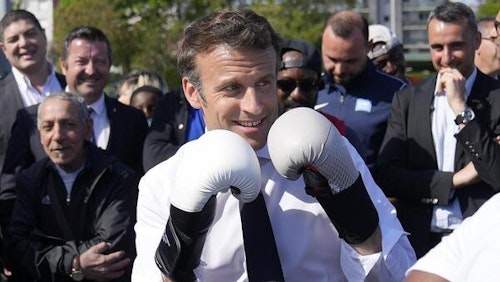
Le Pen is the 'opposition leader for France,' National Rally spokesman Sebastien Chenu tells Euronews
Marine Le Pen is "the opposition leader for France," National Rally spokesman Sebastien Chenu told Euronews, who "represents millions of people".
"We're going to have to be very determined and work very hard," Chenu said of the campaign ahead of the legislative elections in June.
He added that far-left leader Mélenchon should have called on his voters to block Macron's reelection. He added that the war in Ukraine had an impact on the election, preventing "a real debate around national politics."
Far-right TV pundit calls for 'national bloc' to unite for legislative elections
Far-right TV pundit Eric Zemmour called for far-right parties to unite ahead of the legislative elections to counter Emmanuel Macron and other opposition parties.
"This is the eighth time that defeat has struck the name of Le Pen," Zemmour said, referring to the unsuccessful presidential campaigns of Marine Le Pen and her father Jean-Marie Le Pen before her.
"Our coalition is not an option. It's a necessity...we have a country to reconquer," he said.
'Wonderful news for Europe', says Italian prime minister of Macron's victory
Italian Prime Minister Mario Draghi said Macron's victory on Sunday was "wonderful news for Europe."
"We are ready to continue working together, with ambition and determination, at the service of our countries and of all European citizens," Draghi said in a statement posted to social media.
Macron is expected to give victory speech near Eiffel Tower in Paris
The French president, who won a second term in office on Sunday, will speak on the Champ de Mars in front of the Eiffel Tower in Paris. Five years ago, he spoke outside the Louvre Museum, another historic landmark in France's capital city.
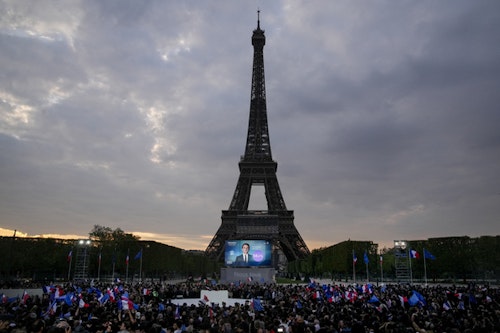
'I look forward to continuing our excellent cooperation', says Ursula von der Leyen
European Commission President Ursula von der Leyen congratulated French President Emmanuel Macron on his re-election.
"I look forward to continuing our excellent cooperation. Together, we will move France and Europe forward," she tweeted.
Far-left leader Jean-Luc Mélenchon calls for people to vote to defeat Macron in parliamentary elections
Far-left leader Jean-Luc Mélenchon called on people to vote in the legislative elections, saying he was worried about Macron's plans to raise the retirement age and his "climate inaction" among other policies.
But he said the defeat of far-right Marine Le Pen was "good news" while qualifying that Macron's "monarchy survives by default."
Marine Le Pen says she has 'hope' after receiving nearly 42% of the vote
Le Pen said her score was "a resounding victory" stating that she had hope and would fight in June's legislative elections.
She said her party the National Rally would unite those who wanted to oppose the newly re-elected president, Emmanuel Macron.
Le Pen said that the "historic score" would allow them to increase the number of MPs in the lower house of parliament, the National Assembly.
"I will never abandon the French," Le Pen said.
Marine Le Pen is giving a speech after the first results in the election
Watch her speech here:
Macron re-elected French president, projections show
French President Emmanuel Macron has been re-elected with 58.2% of the vote, projections show.
Far-right leader Marine Le Pen received a higher score than five years ago, with 41.8%, according to projections.
He is the first president to get a second term since President Jacques Chirac in 2002.
Counting under way in polling stations across France
Votes are being counted in polling stations across the country, with results expected to be finalised throughout the evening.
The first projections will be known at 8:00 pm CET, based on polling gathered from those stations that close at 7:00 pm CET.
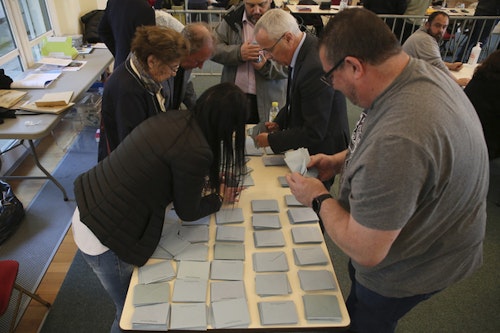
Just 30 minutes to go before the first projections
There are less than 30 minutes to go before we have the first projections for whether Emmanuel Macron will gain another five years in office or whether far-right leader Marine Le Pen will become the first female president in France.
Follow our live television coverage below:
Young voters in France explain why they decided to abstain in the election
Gaspard Hermann, a 24-year-old steeplejack currently working in the French Alps, is one of many young people in France who decided not to vote in the presidential election.
He told Euronews that among the reasons he isn’t voting is because the French are often forced to vote against a candidate instead of for an individual they support.
For some young people who have chosen not to vote in either round of the presidential election, the problem, they say, is that France’s system doesn’t represent them.
“I don't see myself in the current presidential system or in the way it works, in particular, its failure to take into account abstention and blank votes, or the choice of candidates,” said Louise, a 28-year-old who works in development for a group of towns outside of Lyon.
She’s one of many young people between the ages of 18 and 34 who did not vote in the presidential election.
Read more about young people who said they will not vote in the presidential election here.

How much power does France's president have?
In the last 50 years, France’s constitution has evolved, with more power consolidated in the president.
“We have a president in France who presides over the Republic, who controls the government, who controls parliament, who controls the Constitutional Court. It makes a super president,” said Christophe Chabrot, a senior lecturer in public law at the Lumiere University Lyon 2.
“It’s a little bit as if we returned to 1830 when in European monarchies the king was beginning to lose his powers to the prime minister but still retained a lot of power,” Chabrot added.
Critics say France’s parliament is becoming a rubber stamp that approves the president’s bidding, with some politicians calling for a new constitution that brings more balance to the institutions.
“The President of the Republic in France has by law, much more power than any other president in Europe,” said Delphine Dulong, a political science professor at the University of Paris I, Pantheon Sorbonne.
“And in practice, successive presidents have also made very broad, very extensive use of their constitutional rights.”
Read more about France's Fifth Republic here.
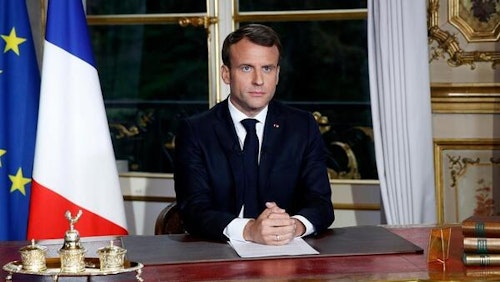
What were the results two weeks ago in the first-round?
In the first round of the election, incumbent President Emmanuel Macron came first followed by far-right candidate Marine Le Pen, with both qualifying for the second round. They were followed by far-left leader Jean-Luc Mélenchon.
Here's what those first-round results looked like:
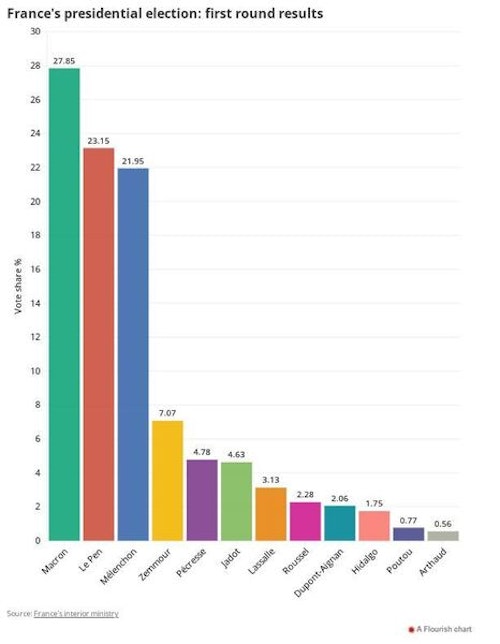
Abstention in the runoff could be the highest since 1969
The abstention rate in France on Sunday could be the highest since the 1969 runoff between Georges Pompidou and Alain Poher when 31% of French voters abstained from the election.
Polling company Ipsos predicted that around 28% of registered voters could abstain in the 2022 runoff between Macron and Le Pen.
Voter turnout lower than in first-round of presidential election
Voter turnout on Sunday was at 63.23% at 5:00 CET, nearly two points lower than what it was two weeks ago for the first round of the election.
Five years ago the participation rate was 65.30% at 5:00pm CET, which means there will likely be a greater number of people abstaining in this year's runoff election.
Macron and Le Pen place their votes on Sunday
France's two presidential candidates placed their votes in the north of France on Sunday. Emmanuel Macron voted in Le Touquet while Marine Le Pen voted in Hénin-Beaumont.
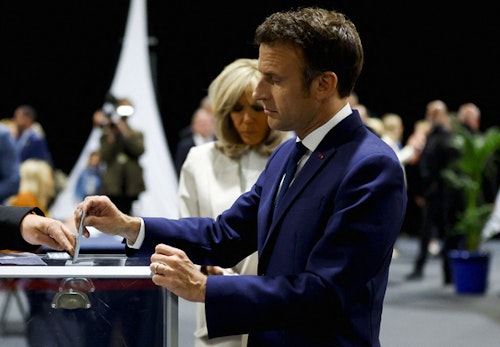
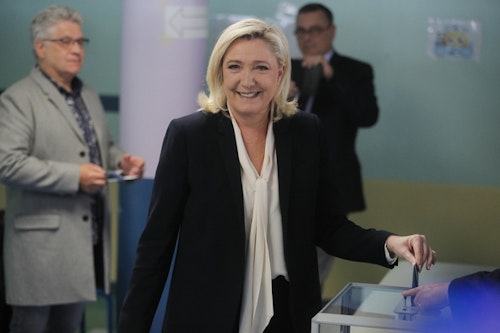
How do French elections work?
Each potential candidate in the election had to get 500 signatures from mayors or local politicians to support their bid for France's top job and then France's constitutional council published a final list of candidates on 7 March.
The official campaign began on 28 March, with French media having to adhere to rules about giving equal airtime to each candidate.
The two candidates with the most votes -- Macron and Le Pen -- in the first round on 10 April are now going head-to-head in the second round on 24 April.
French voters will once again take to the polls in June to vote for the next National Assembly, the country's lower house of parliament.
Read more about how the election works here.
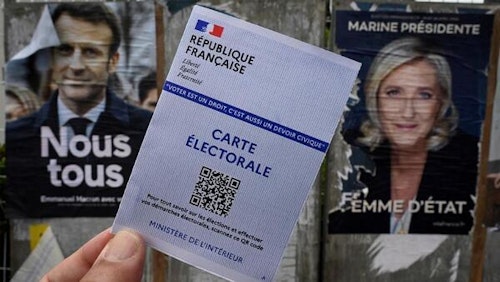
France is choosing its next president. Here's a look at why it matters for Europe.
French voters are choosing their next president after backing Emmanuel Macron and Marine Le Pen for the second round.
Whether the French electorate will choose to stay the course and back the centrist incumbent or choose the far-right leader will have a big impact not just on the country, but also on the European Union and the West in general. France remains one of the world's leading economic and military powers.
Macron and Le Pen have widely different opinions on most topics from how to run the economy, France's role in the EU, and the EU's place in France as well as on foreign policy, the latter a particularly hot topic as Russia's invasion of Ukraine wages on.
Watch this video to learn more about how these elections will impact you.










